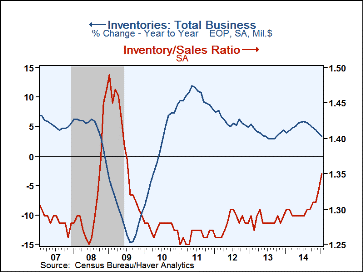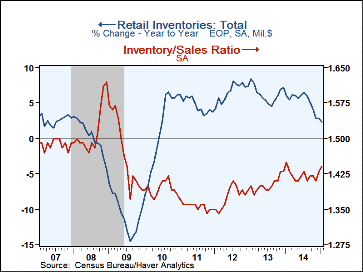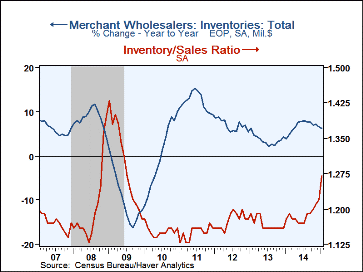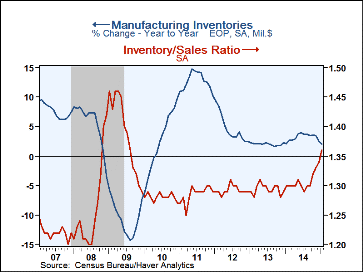 Global| Mar 12 2015
Global| Mar 12 2015U.S. Business Inventory Growth is Reined In
by:Tom Moeller
|in:Economy in Brief
Summary
Total business inventories were roughly stable during January (3.4% y/y), the same as they were in December, earlier reported as +0.1%. During the last three months, inventory growth slowed to 0.3% (AR) from its high of 7.6% late in [...]
Total business inventories were roughly stable during January (3.4% y/y), the same as they were in December, earlier reported as +0.1%. During the last three months, inventory growth slowed to 0.3% (AR) from its high of 7.6% late in 2013. Total business sales, however, fell 2.0% (-0.3% y/y) for the sixth consecutive monthly shortfall. It lowered the 3-month change to -12.9% (AR) versus +10.2% as of last April. The resulting inventory/sales ratio for January rose to 1.35, its highest level since July 2009.
Inventories in the retail sector were roughly unchanged during January (2.3% y/y). It left three-month growth at 0.5%, well below the double-digit growth at the end of 2013. Auto inventories slipped 0.2% (+3.4% y/y). Clothing inventories increased 0.6% (3.2% y/y) and by 9.2% (AR) since October. Furniture inventories slipped 0.1% (+3.5% y/y) and at a 6.6% rate in the last three months. General merchandise inventories gained 0.2% (-0.2% y/y) and were off at a 0.5% rate since September.
Merchant wholesale inventories gained 0.3% (6.2% y/y) in January. The 4.3% rate of growth in the last three months was below the gains since mid-2013. Factory inventories declined 0.4% (+2.0% y/y). It lowered three-month growth to -3.1%.
The 2.0% decline in business sales (-0.3% y/y) reflected across-the-board weakness that left three-month sales down at a 12.9% rate. Retail spending declined 0.9% (+2.8% y/y). Sales excluding motor vehicles fell 1.3% (+0.4% y/y) and at a 9.1% rate since October. Wholesale sales fell 3.1% (-1.0% y/y) leaving three-month sales falling at a 16.4% rate. Factory shipments declined 2.0% (-2.1% y/y) and at a 14.7% rate during the last three months.
The rise in the total business inventory-to-sales ratio to 1.35 reflected gains in each business sector as inventory growth outpaced sales. The factory sector's rise to 1.36 left the ratio at its highest since early-2009. The same was true for the wholesale sector ratio of 1.27. Any build-up at the retail level has been more controlled as the I/S rise up just moderately of late. The ratio excluding autos, however, rose sharply in the last three months to its highest level since September 2010.
The manufacturing and trade data are in Haver's USECON database.
| Manufacturing & Trade (%) | Jan | Dec | Nov | Jan Y/Y | 2014 | 2013 | 2012 |
|---|---|---|---|---|---|---|---|
| Business Inventories | -0.0 | -0.0 | 0.2 | 3.4 | 3.8 | 4.4 | 4.9 |
| Retail | -0.0 | 0.5 | -0.3 | 2.3 | 2.8 | 7.2 | 7.4 |
| Retail excl. Motor Vehicles | 0.1 | 0.0 | 0.1 | 1.8 | 2.3 | 3.8 | 3.2 |
| Merchant Wholesalers | 0.3 | -0.0 | 0.8 | 6.2 | 6.6 | 4.3 | 5.5 |
| Manufacturing | -0.4 | -0.4 | 0.0 | 2.0 | 2.5 | 2.3 | 2.4 |
| Business Sales (%) | |||||||
| Total | -2.0 | -1.0 | -0.4 | -0.3 | 3.6 | 3.4 | 4.5 |
| Retail | -0.9 | -1.1 | 0.4 | 2.8 | 3.8 | 4.3 | 5.0 |
| Retail excl. Motor Vehicles | -1.3 | -1.2 | 0.1 | 0.4 | 2.6 | 3.0 | 4.2 |
| Merchant Wholesalers | -3.1 | -0.9 | -0.4 | -1.0 | 5.1 | 4.4 | 4.8 |
| Manufacturing | -2.0 | -0.9 | -1.0 | -2.1 | 2.3 | 2.0 | 4.0 |
| I/S Ratio | |||||||
| Total | 1.35 | 1.33 | 1.31 | 1.30 | 1.30 | 1.28 | 1.28 |
| Retail | 1.44 | 1.43 | 1.41 | 1.45 | 1.42 | 1.40 | 1.38 |
| Retail Excl. Motor Vehicles | 1.26 | 1.24 | 1.23 | 1.24 | 1.23 | 1.22 | 1.22 |
| Merchant Wholesalers | 1.27 | 1.22 | 1.21 | 1.18 | 1.19 | 1.17 | 1.18 |
| Manufacturing | 1.36 | 1.34 | 1.33 | 1.30 | 1.31 | 1.29 | 1.29 |
Tom Moeller
AuthorMore in Author Profile »Prior to joining Haver Analytics in 2000, Mr. Moeller worked as the Economist at Chancellor Capital Management from 1985 to 1999. There, he developed comprehensive economic forecasts and interpreted economic data for equity and fixed income portfolio managers. Also at Chancellor, Mr. Moeller worked as an equity analyst and was responsible for researching and rating companies in the economically sensitive automobile and housing industries for investment in Chancellor’s equity portfolio. Prior to joining Chancellor, Mr. Moeller was an Economist at Citibank from 1979 to 1984. He also analyzed pricing behavior in the metals industry for the Council on Wage and Price Stability in Washington, D.C. In 1999, Mr. Moeller received the award for most accurate forecast from the Forecasters' Club of New York. From 1990 to 1992 he was President of the New York Association for Business Economists. Mr. Moeller earned an M.B.A. in Finance from Fordham University, where he graduated in 1987. He holds a Bachelor of Arts in Economics from George Washington University.










